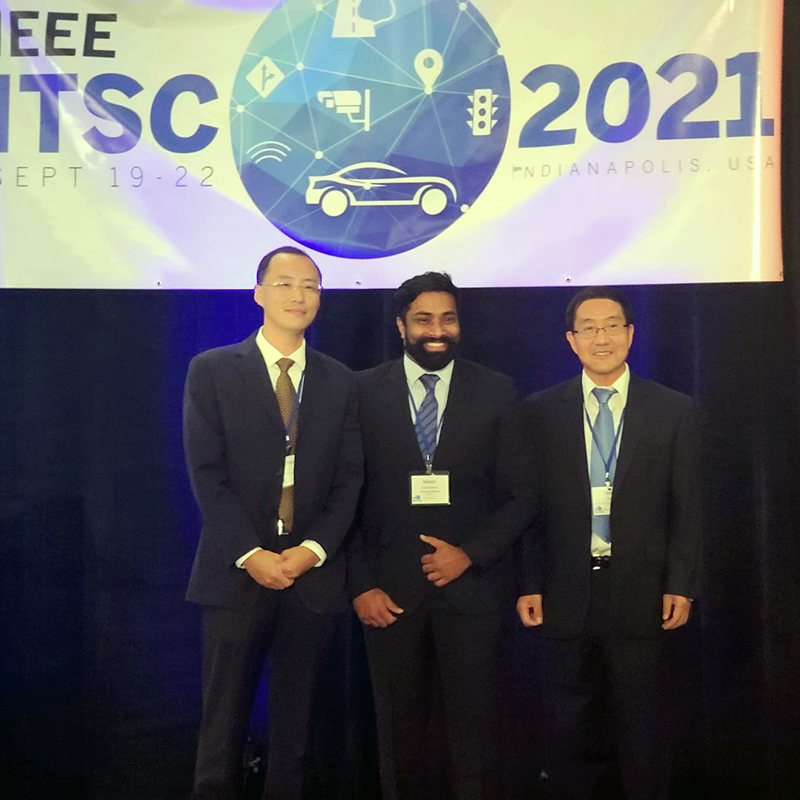 |

|
 |
The ITSC 2021 Best Student Paper Award ceremony in Indianapolis in September. At left is Lingxi Li, Program Chair of ITSC 2021 and Professor of Electrical and Computer Engineering at Purdue University. Nilesh Suriyarachchi, the paper’s first author, is in the center. At right is Yaobin Chen, General Chair of ITSC 2021 and Director of TASI, Professor of Electrical and Computer Engineering, and Chancellor's Professor at Purdue University. |
|
A paper about connected autonomous vehicles written by three ECE Ph.D. students and their advisor has won the Best Student Paper Award at the 2021 IEEE International Conference on Intelligent Transportation Systems (ITSC). ITSC is the flagship IEEE conference in intelligent transportation.
"Real-Time Priority-Based Cooperative Highway Merging for Heterogeneous Autonomous Traffic" was written by Nilesh Suriyarachchi, Faizan Tariq, Christos Mavridis and their advisor, Distinguished University Professor John Baras (ECE/ISR).
It is well known that highway on-ramp merges are major bottlenecks in transportation networks. Connected autonomous vehicles (CAVs), with their advanced sensing and communication capabilities, provide an opportunity for modern algorithms to capitalize on the possibilities for vehicle cooperation.
The paper describes a way for CAVs to improve highway merging efficiency and safety. A new algorithm is introduced that optimally coordinates CAVs to maximize the flow of vehicles, taking into account the varying priorities of different vehicle classes when selecting the best merging sequence. The algorithm is capable of real-time operation through parallel computation, optimized merge sequence generation, and managing heterogeneous (multi-class) traffic. Results are verified through a realistic traffic simulation software.
"This work focuses on the use of a hybrid rule and optimization approach to provide optimal merging efficiency with both real time operation and safety guarantees,” says first author Nilesh Suriyarachchi.
Suriyarachchi’s PhD research focuses on leveraging the control and communication capabilities of CAVs to solve many existing transportation problems and bottlenecks. He is currently looking into cooperative control strategies for CAVs using either a decentralized Vehicle to Vehicle (V2V) approach or a centralized Vehicle to Infrastructure (V2I) approach. “In addressing these problems I have applied both optimization-based robust control approaches as well as deep reinforcement learning methods,” he says. “My focus here is to ensure safety, robustness and efficiency of operation in complex situations such as highway merging, overtaking, traffic bottlenecks and other emergency conditions."
This summer, Suriyarachchi gave a talk on his work to the KTH Integrated Transport Research Laboratory. Read the story and view the slides from his talk here.
Related Articles:
New GAMEOPT framework will help future autonomous vehicles safely navigate unsignalized intersections
Ph.D. student Nilesh Suriyarachchi gives seminar on connected autonomous vehicles for KTH
Workshop honors alum Naomi Leonard
Alum Fumin Zhang elected to IEEE Fellow
UMD Team Wins IEEE IROS Best Paper Award in Agri-Robotics
Baras, Sadler part of large ARL DataDrivER project
Accolades abound for graduating ECE Ph.D. student Nilesh Suriyarachchi
Chahat Deep Singh's robot bee work featured in BBC video
The Falcon and the Flock
New algorithms for multi-robot systems in low communication situations
October 7, 2021
|

